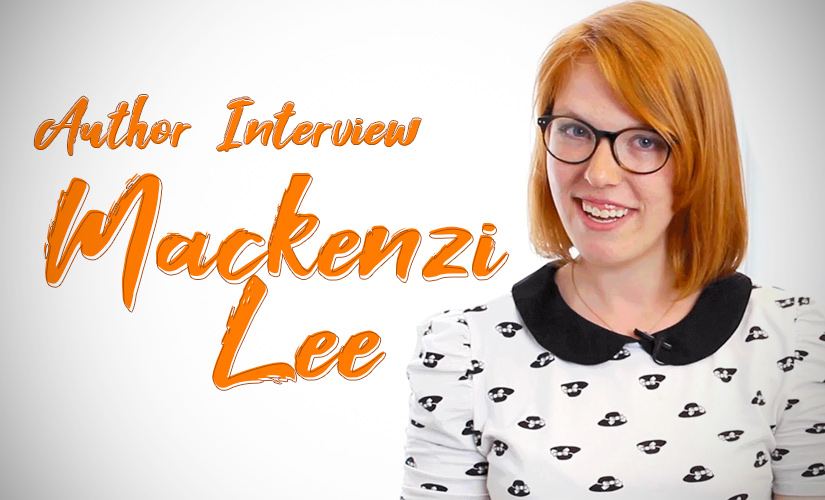
Mackenzi Lee is the author of The Gentleman’s Guide to Vice and Virtue, a New York Times bestseller and #1 Indie Next pick, and upcoming sequel The Lady’s Guide to Petticoats and Piracy.
Kirkus Reviews called The Lady’s Guide to Petticoats and Piracy, “An empowering and energetic adventure that celebrates friendship between women.”
The novel follows Felicity Montague, who must use all her wits and cunning to achieve her dreams of becoming a doctor—even if she has to scheme her way across 18th-century Europe to do so.
Enter the audiobook giveaway for your chance to win A Lady’s Guide to Petticoats and Piracy!
RM: Your main character, Felicity Montague, aspires to be a doctor in a field dominated by men. What first drew you to her as a character, and what surprised you?
ML: In the first book, The Gentleman’s Guide to Vice and Virtue, Felicity is the member of our trio of leading characters who always has things under control. When Monty and Percy are falling apart and busy having feelings, Felicity is the one who handles everything and never loses her cool. So the idea of writing about her as a main character and getting to expose a few of her cracks and flaws and the turmoil under that veneer, not to mention what happens when she’s not as in charge as she wants to be, was so appealing to me. What surprised me was how much she and I ended up having in common. Monty and I are very similar, so I assumed, since he and Felicity are so different, there would be less of me in this book. It was so surprising and delightful to see what pieces of me shone through in Felicity. I learn something about myself with every book I write.
RM: The Lady’s Guide to Petticoats and Piracy is the sequel to The Gentlemen’s Guide to Vice and Virtue. Did you plan that out beforehand? How did the novel evolve for you over the time you wrote it?
ML: I didn’t think Gentleman’s Guide would take off the way it did, let alone have enough of a readership to warrant a sequel, so I had no plans to write it. But since I had readers who seemed to love this world and these characters as much as I do, it felt like a natural next step to take. When I originally started plotting a second book (at the urging of my editor), I intended to make it another Monty-narrated book. But he and Percy already got their happy ending and I didn’t want to mess with that. So instead, I looked to Felicity, and her story sort of unfurled.
RM: The novel traverses 18th-century Europe. What sort of research did you do for the setting?
ML: So much! I initially became interested in the 18th century grand tour in college, so I’ve been reading on and off about it for years. When I started working on the book, I read other historical fiction set in the time period, primary sources like journals and letters and travel logs from 18th century tourists, nonfiction books about the time period…and then started writing and still found myself wildly unprepared. I spend so much time researching while I’m writing because you never know what strange, small details about things like 18th century socks and soap and banking you’re going to need until you get there. My biggest advice for writing historical fiction is always start before you’re ready—research can so easily become a procrastination technique. I also spent a year traveling Europe—long before I knew this book would someday exist, but I visited all the same places Monty and Percy and Felicity go in the first book, and many Felicity visits in the second. Traveling is always the best research.
RM: Did you always want to be a writer?
ML: Not necessarily, but I always wanted to be a storyteller. I initially planned to become an academic and earn a PhD in history, but once I got to university, I quickly realized that my writing was not suited to academia—nor were the stories I wanted to be telling. I love the way historical fiction gives individuality to large historical events and looks at them through a smaller, more intimate lens. It has always made history feel more real and relatable to me. Historical fiction was the way I first discovered my love of history, so it’s kind of surprising I didn’t realize I wanted to write it sooner!
RM: You are also a bookseller. How has being on that side of the book business informed your writing?
ML: Publishing is a tough business. You can often feel like there are so many books, yours is lost in all the noise. When I’m on the floor with customers, it’s always a good reminder that readers don’t care about things like marketing campaigns and foreign sales and royalties and all those nuts and bolts that make authors feel inadequate. They just want great books. Getting to talk to people about the books they love always reminds me how important stories are. Bookselling has been a critical part of keeping my head on straight and remembering why I do what I do when I’m frustrated with the business side of the publishing industry.
RM: What do you have on your bookshelf or audiobook queue now? Do you have any recommendations of recent books?
ML: I do so much of my reading via audiobooks—I have since I was a kid. It’s my favorite way to consume books. Right now, I just finished listening to Bad Blood which was a MIND BLOWING true story, and I just got Station Eleven queued up, because I’m super late to that party.



